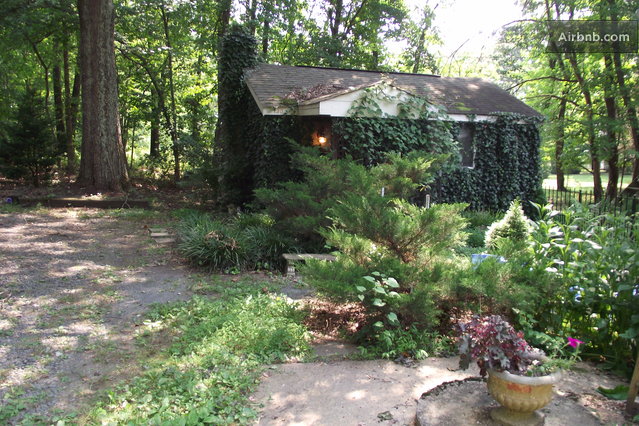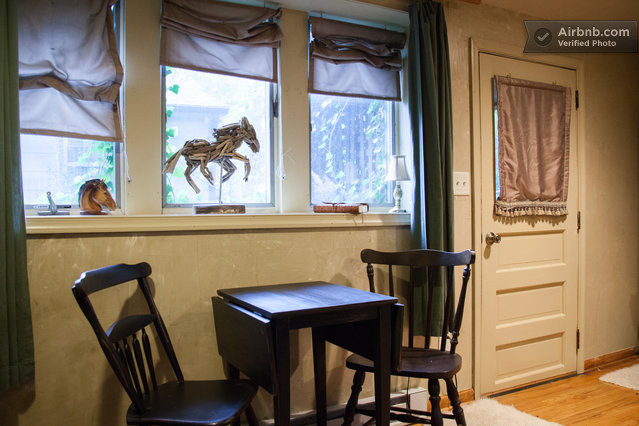“a woman must have money and a room of her own if she is to write fiction….” — Virginia Woolf
A long, lazy drive to Charlottesville, taking nearly all back roads and finding myself (I recognized it before I read the sign) at the entrance to Somerset Farm. It wasn’t where I was going, but I headed up the the narrow and winding drive nonetheless, just to see it, just to check and find that the little clapboard cottage was still there– the one where Adam lived all those years ago. Bill and I would head south (in those days it was south) for the weekend, pulling in after dark and parking on the grass, and there we made a weekend with Adam (and, sometimes, other friends) of sleeping late and hiking the mountain, of drinking red wine and listening to Van Morrison after dark, of cooking and eating dinner impossibly late and then watching Woody Allen movies until 3.
That’s how the weekend started for me: my car humming at the top of the winding drive, and I just checking on that familiar house, unchanged, looking at and remembering the view. So precisely the same.
But that wasn’t where I was going. I wasn’t needing Adam- or Wendy, or Darcy, or Mike- this weekend, or Bill, or the children. A view wouldn’t do for me, and not too much in the way of red wine, either. I would be needing quiet– so Van would have to stay home– and if I was going to be up late, it would be with fingers curled over keyboard, not watching Woody or anyone else, for that matter.
I was going to a room of my own.
It’s what Viriginia Woolf said we women would need if we wanted to write fiction– and Virginia wrote fiction, breath-taking fiction. Her perfect novel, To the Lighthouse, breaks my heart with its perfection.
She was writing in another time, of course. A time without dishwashers or automatic washing machines. A time when, say, running a household could take Very Nearly Absolutely All one had. So money would be essential in her time: one would have to have one’s needs met. It would be very difficult, I think, to write a novel while simultaneously stirring the risotto.
Of course, I suppose it could be done. I have a friend who started and finished a novel recently while homeschooling three young children. She scrawled it out free-hand in a spiral-bound notebook while waiting in the car during her kids’ music lessons, or perched on the bleachers during swim-meets. Needless to say, I am very impressed by this.
This is not how I have written mine.
I have, instead, typed it at high velocity into my little laptop, sitting at the kitchen table, standing at the counter, wedged on the floor between coffee-table and living room sofa. I have also typed nothing at all for what felt like hours: pacing the kitchen floor, making a slow race-track of the house, staring blindly over the deck railing in search of inspiration. I have done this while my children have been at school, forcing myself to focus and then, of course, forcing myself to break away when time demanded: errands to be done, children retrieved, the afternoon-evening helter-skelter about to begin.
I suppose this means I have had money enough, right Virginia? The gift of this time was unlooked-for and certainly unexpected, and I am nothing but grateful.
The room of my own bit, consequent to the lives of my family members, has been less of a concern. And I know that Ms. Woolf meant things other, in her essay, than this meager analysis suggests. But the room of my own has always sounded like a good idea. It’s all one needs, really, to write a book: silence and the space in which to hear the world of one’s mind.
And so my husband thought he’d let me try it: a little cottage away in Charlottesville, that town-city we grew to love all those years ago. A weekend away in a one-room cottage. Off I went.
I didn’t know I needed it. I’d never done anything like this before. I didn’t know how I’d love the luxury of no one depending on me, of working whenever and as long as I liked, of taking (both) a walk and a run through a patch of Virginia’s horse-country, of two separate and unaffected visits to Starbucks. Of the way the cloudless sunlight falls through the trees of those hill-ridden, winding roads, of the glory of a desk by the window, of an hour or two on the grounds and in the house called Monticello.
And I didn’t know either (though I’d hoped) that I would finish it, that the baby I threatened to birth in my 44th year would be (like my daughter) one born in February. But then there it was on Saturday night, alone in that room of my own: the nameless novel, all 25 chapters (plus the epilogue), finished.
I am so grateful.
Maybe Virginia was right– in my case, anyway.




